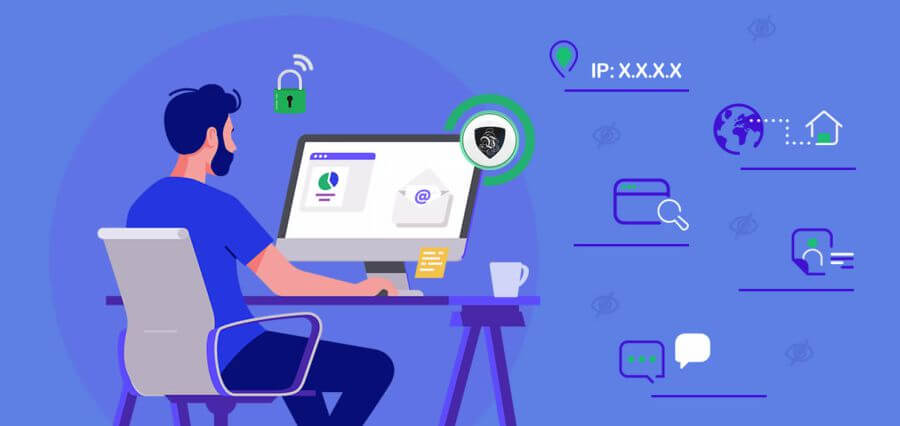You need an internet protocol (IP) address for any internet connection; your internet service provider (ISP) usually provides your IP address. Since your ISP provides the IP address, all your activities on the internet are trackable by your ISP; the situation has become very critical, especially when access to the internet has become crucial for your daily activities.
Your browsing history, credit card details, and other personal information will be visible to your ISP; if your ISP is not trustworthy, your data can be up for grabs. To avert the situation where anybody can steal your browsing history, you may want to resort to private browsing; incidentally, private browsing may not be all that safe.
Private browsing should confer privacy on your internet activities because some modern-day browser extensions, such as Google Chrome and Microsoft Edge, have inbuilt features that ensure your browser does not save your search history. However, you still require an ISP for your IP address.
Statista reports an increase of 37 percent in data breaches in the third quarter of 2022 compared to the second quarter globally; this indicates that cybercriminals are dedicating serious time to their nefarious activities. The solution to data breaches is masking your IP address.
The pertinent question is, how do you mask your IP address? The solution is right there – a virtual private network (VPN).
What is a VPN?
VPN, an acronym for virtual private network, is a service that ensures your privacy online. By providing a secure and encrypted connection between your computer and the internet, a VPN enhances a private tunnel for sending and receiving information any time you use public Wi-Fi networks.
A few years back, VPNs were novel tech solutions; the situation has dramatically changed. VPNs have become necessary tools. You need a VPN to ensure maximum protection; a VPN will secure your data and browsing history whenever you are online.
A VPN ensures nobody can peek into your private life and activities online; as a tunnel that encircles you, a VPN masks you in anonymity, encrypts your connection, hides your IP address, and blocks anyone from seeing what you are doing.
What is an IP address?
An IP (internet protocol) address is a special numerical code you use to identify a device on the internet or a local network. Your IP address enhances the exchange of information between devices on a network; with an IP’s location information, your devices are accessible for communication.
The IP address provides the means the internet needs to differentiate between various computers, routers, and websites.
Why is it dangerous to browse the internet without VPN?
Whether you have an organization or go online for yourself, you should know that browsing the internet without protective measures can be risky. Once you connect to the internet, you expose yourself and your organization to hackers and thieves, who prowl the web continuously, looking for personal information, web browsing history, and credit details to steal.
Usually, data is shared between your ISP and your computer; third parties can also trace your browsing activities, even with private browsing. Hackers look for the slightest opportunity to exploit entryways into your operating system.
Your browsing activities rely on the IP address of your ISP; where your ISP is trustworthy, you can still have accidental leaks; the way out is to ensure complete masking of your IP address. IP address masking can only be obtainable with a VPN.
VPN service providers such as Urban VPN, Nord VPN, Proton VPN, and 1Click VPN are relentlessly fighting tooth and nail to ensure that the cyber world is secure by providing free VPNs for people who may not be able to afford paid VPNs.
Since your ISP provides your connection online, your search history, internet browsing, and historical data are not secure; you can only secure your online activities with a VPN.
How a VPN masks your IP address and hides your activity
A VPN should fulfill tasks such as encrypting an IP address, encryption of logs, kill switch, and multifactor authentication. Your VPN will encrypt your online presence.
You will need a key to decipher the encryption; only your VPN and computer know the key. The encryption makes it impossible for your ISP to discover where you are browsing.
There are different ways VPNs can encrypt your data, but fundamentally the encryption process is usually in three stages:
- Booting up your VPN – Once you are online, the VPN acts as a secure tunnel through which you can send and receive information between you and the internet; your ISP, hackers, or any other third party won’t be able to see into this tunnel.
- The second process is to change your original IP address to an IP address your VPN servers will provide; your device is now effectively on the VPN’s local network.
- The VPN protects and secures your personal information, and you can go on with your browsing without the fear of prying eyes seeing your activities.
Conclusion
Two critical steps to protect yourself while browsing the internet are measures you take to mask your IP address and encrypt your data. Browser extensions with features for private browsing will ensure your data is not stored, but that does not mean your ISP and any other third party cannot see your browsing activities.
Only a VPN will mask your IP address and encrypt your data; the encryption ensures that if your data accidentally falls into the wrong hands, it will look gibberish and useless to such parties.
| Click Here For More News and Blog |


